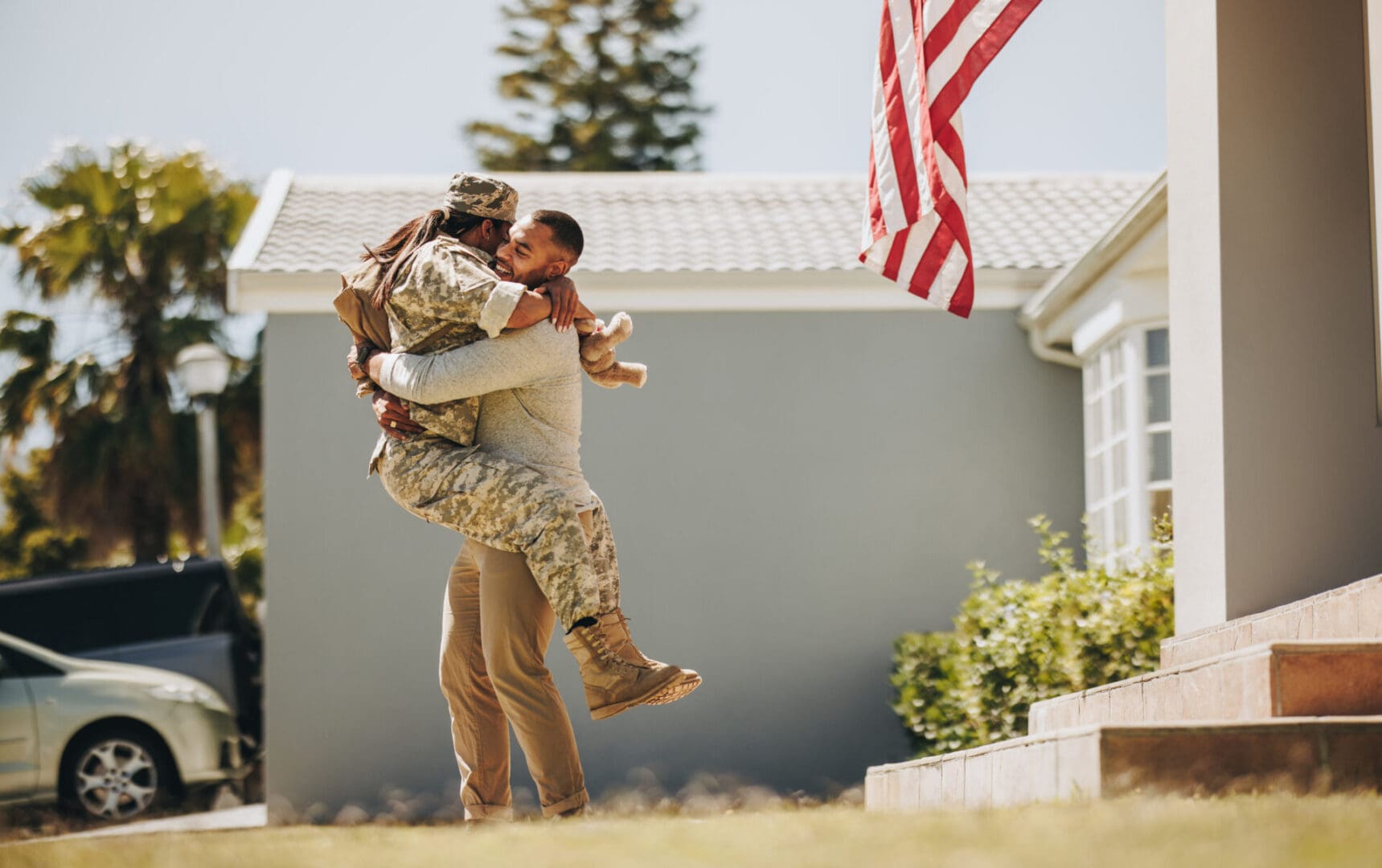There is no better feeling than welcoming home your service members from deployment. Months, days, hours, and minutes all counting down to the moment you get to hug them. A lot of stress releases and you are able to take a deep breath again. While this may be true, when a soldier returns home from deployment too many people forget how much this can change things. For the soldier returning from deployment it can require more than just exclaiming the phrase “Honey, I’m Home.” It requires an amplitude of patience, kindness, commitment, and love. This change may be one of the most difficult tasks you and your partner take on, but once you make it through, you’ll feel more connected than ever before.
Preparing at Home
Getting things ready for your partner to return home can be such an exciting feeling. You spend hours shopping and making things to welcome your service member home. However, it can also be very stressful. You are preparing for a huge change and may have little to no information about how things are going to go. According to Plan My Deployment it important to “make sure expectations are realistic, and don’t spend too much time daydreaming about the perfect reunion” (Fletcher, 2023). Although it will be easy to be thinking about exactly how you expect things to go, it is so important to have backup plans and understand this is more than a movie. There are going to be a lot of emotions and things may become more complicated than expected. While you can still keep the excitement of seeing your partner, it is necessary to be prepared for anything. Whether you experience deployment delays, travel delays, or anything else, understand this is a huge moment for your partner. Returning home is never very easy even when the both of you are looking forward to it.
With emotions running high and energy running low, things can be a little awkward. Prepare for the first few moments together to feel like a new relationship. All you can do is make your service member feel noticed and loved. Whether you plan a surprise party, pick up their favorite snacks, make a sign, or anything else they may love, prepare for them to take a moment to appreciate it. As Military.com explains, “if he or she is too tired to notice at first, don’t be concerned. We all feel exhausted after long trips home – what we don’t see right away, we do notice eventually” (Duttweiler, 2021). The delayed appreciation never means they don’t recognize the effort you put in, so try your best to not be too discouraged and just understand they are feeling a lot of emotions. The best thing you can do is be open and honest with your partner (after a good night sleep)!
First Moments Together and Catching Up
All you have done to prepare, all the dreaming about time together, all of that hard work leads up to this moment. The moment you get to finally exhale, hold your loved one tight, and feel at peace once again. This moment can be very euphoric and exciting, but it can also be very awkward. After all, it has been months since you were last able to physically be with your partner. Although the stress levels have lowered, remember that they may still linger for a few weeks. You may feel confused about why you are not completely stress free even though you are finally able to see your partner. It was found that, “spouses’ stress ratings were usually significantly correlated” (Allen et al., 2011), so use this as one of the first things you are both able to work through together. You both are feeling like your world has tipped sideways, so practice those great communication skills, and overcome this together.
Remember when you had no idea what each other’s day-to-day life looked like? Remember when you were lying in bed thinking about how your partners day was? Now is the time you no longer have to worry. This is such a rewarding feeling but can also be difficult to come to terms with the fact that things have changed. The civilian in the relationship may not understand what the service member went through and may not know much about the people they were with. On the other hand, the service member needs to now readjust to civilian life while catching up on what your life has looked like.
In my experience, I found it easy to catch my partner up on my life because it included the same people he knew about before he left. However, when hearing about what I missed in his life, I felt estranged from his friends and found myself not knowing how to respond to a lot of what he told me. Remember these emotions are all completely normal, so be patient with one another throughout this process.
New Schedules and Continuing On
Day to day life is going to look a lot different for both you and your partner. For the service member, they can feel very lost and as though they are experiencing many setbacks. Battle mind training is commonly used to help soldiers readapt to civilian life; focusing on their mental health. Research has shown, “battlemind sessions (with lots of interaction in educational sessions) had mental health benefits for individuals with high combat exposure, compared to a (less interaction) homecoming briefing” (Kennis & Te Brake, 2022). Although it may feel like the right thing to do is to jump back into where you left off, this is far from the truth. The more you ignore these huge life changes, the more difficult they will become for both you and your partner. It is your job as the civilian partner to try to make this homecoming process as easy as possible and that all begins with finding programs and talking through things (instead of ignoring them).
Well, it is beyond obvious that things will change and shift a bit after your service member returns home, it is important to also keep some of the same schedules you had before. Furthermore, “knowing that the family is engaging in familiar activities may also reassure the deployed partner that s/he knows what is happening at home” (Gewirtz et al., 2011), by continuing some of your day-to-day life activities your partner will feel more involved. It can be extremely difficult to be thrown into a life that you know nothing about, so your service member may find comfort in doing some of your “regular” activities again. The best way to integrate new schedules is to slowly add in one thing at a time instead of changing everything at the drop of a dime.
It is normal to feel like more issues have arisen since your partner has returned home. Were they faithful to you? Are they still just as committed to the relationship? If you have children, how will readjusting their parent back into their lives look? While all of these are very common questions to have, it is so important to not jump to conclusions and understand your service member is probably wondering the same thing. With that being said, it is crucial to understand the boundaries the two of you already have set in place. If your spouse is returning home keep in mind that, “for the male soldiers, in particular, the need to take ‘command’ of the household after homecoming surfaced strongly” (Heinecken & Wilén, 2019). These boundaries being pushed around can make this process even more difficult. Do I bring up the questions and concerns I am having? Should I say nothing at all to not rock the boat? When having these thoughts, it is most important to remember that open communication will always create the healthiest relationships.
While navigating these changing times, it is important to remember that each service member has had different experiences. Some have leaders that are very involved and aim towards helping their squad while others may be provided with little to no guidance throughout their journey. Recounting deployment memories can be very challenging, however, “soldiers who view their leaders as engaging in greater levels of moral awareness during deployment will report fewer symptoms of posttraumatic stress disorder (PTSD), anxiety, and depression” (Gutierrez & Krauss, 2023). It is normal for your service member to not want to talk about everything they have done and seen because it can be quite traumatic. All you can do is remember they may not have been provided with the best support and all you can do now is try to create that amazing support system for them.
Taking Care of Yourself
In order to provide a high level of support to your partner, you first need to make sure to care for your own needs. Give yourself a pat on the back for making it through this extremely hard time and take some time for self-care. This is incredibly important considering since research indicates a large portion of spouses are experiencing depression and anxiety during their family member’s deployment (Warner et al., 2009). Family members can even experience symptoms related to PTSD, so it is critical that everyone receives the support that they need. All of these emotions are valid and understandable, but now that you have made it through, it is important to slowly adjust yourself back to normal. It is okay to have moments that feel more anxious and stressful than happy even with the nearing arrival of your service member. I suggest you take part in some of these activities listed to make sure you are caring for yourself properly:
- Have a self-care day (bath, massage, facial, etc.)
- Spend a day with friends or family
- Go on a picnic and journal
- Do some volunteering
- Go do that workout class you’ve been dying to try
Returning home from deployment can feel stressful and overwhelming even though it should be the happiest of times. Just remember, do what you can to be there for your service member and yourself. Be patient with the relationship and applaud yourself for nurturing this partnership. Everything will begin to settle down and feel normal once again but remember feeling all of these emotions will only prosper the relationship further.
References
- Allen, E. S., Rhoades, G. K., Stanley, S. M., & Markman, H. J. (2011). On the Home Front: Stress for Recently Deployed Army Couples. Family Process, 50(2), 235–247.
- Duttweiler, R. (2021, June 14). Here’s what you need to know about reintegration. Military.com. Retrieved from: https://www.military.com/spouse/military-deployment/returning-to-home-life-after-deployment.html
- Fletcher, R. (2023, August 18). Military reunion & reintegration after deployment. Plan My Deployment. Retrieved from: https://planmydeployment.militaryonesource.mil/reunion-reintegration/family-members/what-to-expect-an-overview-of-reunion-and-reintegration/
- Gewirtz, A. H., Erbes, C. R., Polusny, M. A., Forgatch, M. S., & Degarmo, D. S. (2011). Helping military families through the deployment process: Strategies to support parenting. Professional Psychology, Research and Practice, 42(1), 56–62.
- Gutierrez, I. A., Krauss, S. W., & Adler, A. B. (2024). Leadership in moral awareness: Initial evidence from U.S. Army soldiers returning from deployment. Psychological Trauma : Theory, Research, Practice and Policy, 16(7), 1233–1237.
- Heinecken, L., & Wilén, N. (2021). No Place Like Home? Postdeployment Reintegration Challenges Facing South African Peacekeepers. Armed Forces & Society, 47(3), 415–434.
- Kennis, M., & te Brake, H. (2022). Facilitating the transition home after military deployment: a systematic literature review of post-deployment adaptation programmes. European Journal of Psychotraumatology, 13(1), 1-18. https://www.ncbi.nlm.nih.gov/pmc/articles/PMC9359196/
- Warner, C. H., Appenzeller, G. N., Warner, C. M., & Grieger, T. (2009). Psychological Effects of Deployments on Military Families. Psychiatric Annals, 39(2), 56–63.





